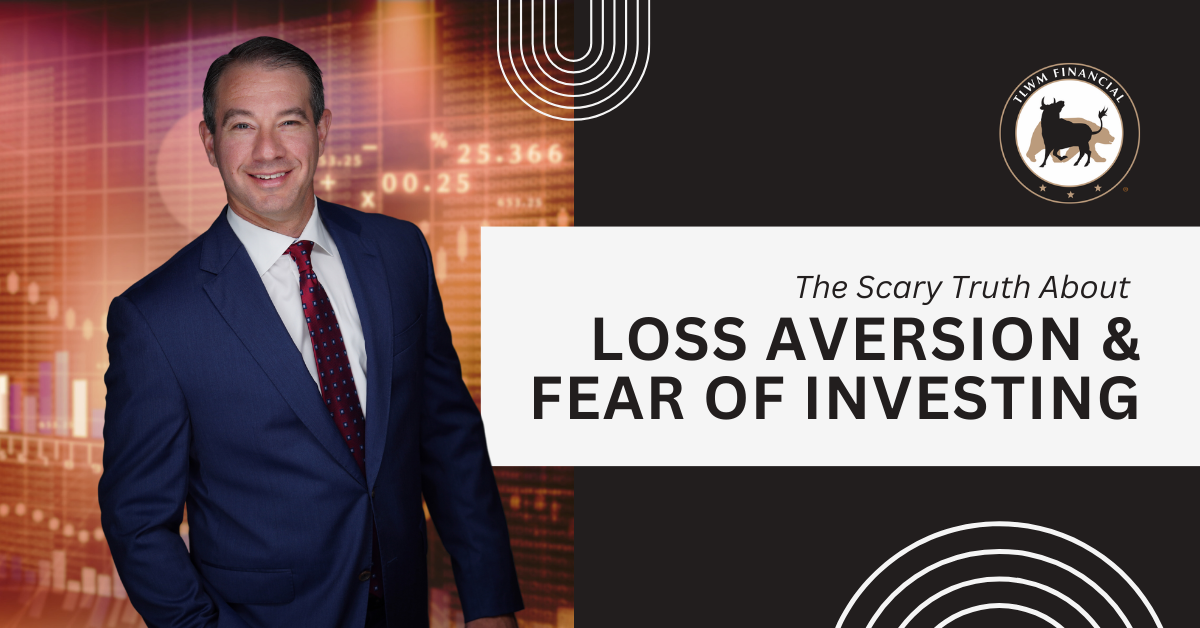The Scary Truth About Loss Aversion and Fear of Investing
Submitted by TLWM Financial on October 10th, 2023
Loss aversion, or the phenomenon of experiencing losses much more severely than gains, can lead to unwise investment decisions. Whether you're hanging on to a loser of a stock for longer than you should or are afraid to invest at all for fear of purchasing at a high point, making emotion-based investment decisions could mean leaving money on the table.
Below, we discuss how fear and anxiety can negatively impact your investing decisions, as well as some steps you can take to minimize this impact and reduce the stress of investing.
How Loss Aversion and Other Fears Can Impact Investing
Fear of losing your hard-earned money may lead to irrational behavior and bad decisions. In behavioral psychology, loss aversion is incredibly common; this means that most people will be more upset about losing $100 than they would be happy to find $100.
For investors, this means you could find yourself hanging onto an investment you've lost money on, despite the opportunity cost of having that money tied up, just because you don't want to cash out and realize the loss. This not only risks a further decline in the investment, but it can also prevent you from allocating these funds in a wiser way.
Loss aversion also comes into play during recessions, depressions, or other volatile markets. No one wants to lose money on an investment, so the temptation to cash out when the market is on a downswing can be overwhelming. However, this also may mean that you may be equally reluctant to re-enter the market when it's back on an upswing. This approach has a double negative impact: instead of buying low and selling high, you're selling low and buying high.
How to Manage Emotional Investing
Investing with your heart instead of your mind could result in losing money. Instead of letting emotions drive your investment decisions, try the following strategies:
- Review asset allocation. If the way your funds are invested no longer meshes with your risk tolerance and investment timeline, rebalancing your funds could help avoid making snap decisions.
- Consider a buy-and-hold or "set it and forget it" approach. The more closely you monitor your investment balances, the more tempted you may be to take action. By checking investments periodically to ensure they still fit into your desired asset allocation, then consciously leaving them alone until the next scheduled checkup, you should be able to reduce a great deal of financial stress.
- Work with a financial professional. Having a financial professional on your team can make investing less scary and provide an appropriate check on your decision-making process. A financial professional can help talk you through investing decisions to make sure they make logical sense and fit into your overall wealth-building strategy.
By focusing on rational, prudent trading strategies, you can mitigate many of the most common traps that can arise when loss aversion and other psychological phenomena may impact your judgment.
Important Disclosures:
The opinions voiced in this material are for general information only and are not intended to provide specific advice or recommendations for any individual. To determine which investment(s) may be appropriate for you, consult your financial professional prior to investing.
Investing involves risks including possible loss of principal. No investment strategy or risk management technique can guarantee return or eliminate risk in all market environments.
Asset allocation does not ensure a profit or protect against a loss.
Rebalancing a portfolio may cause investors to incur tax liabilities and/or transaction costs and does not assure a profit or protect against a loss.
This article was prepared by WriterAccess.
LPL Tracking #1-05376140

